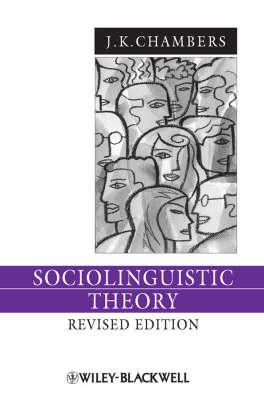Overview
The revised edition of Sociolinguistic Theory presents a critical synthesis of sociolinguistics, centering on the study of language variation and change. A revised introduction to sociolinguistic theory by one of the top scholars in the field Provides a critical synthesis of sociolinguistics that centres on the study of language variation and change, now incorporating the latest developments in the field Shows how empirical explorations have made sociolinguistics the most stimulating field in the contemporary study of language Discusses the linguistic variable and its significance, crucial social variables such as social stratification, sex, and age, and the cultural significance of linguistic variation
Full Product Details
Author: J. K. Chambers (University of Toronto, Canada)
Publisher: John Wiley and Sons Ltd
Imprint: Wiley-Blackwell
Edition: 3rd edition
Dimensions:
Width: 15.30cm
, Height: 1.90cm
, Length: 23.00cm
Weight: 0.422kg
ISBN: 9781405152464
ISBN 10: 140515246
Pages: 354
Publication Date: 14 November 2008
Audience:
College/higher education
,
Undergraduate
,
Postgraduate, Research & Scholarly
Format: Paperback
Publisher's Status: Active
Availability: Available To Order

We have confirmation that this item is in stock with the supplier. It will be ordered in for you and dispatched immediately.
Reviews
?Chambers offers a lucid introduction to the basic issues that relate language and society, and leads the reader directly to the quantitative data that define the field. At each turn, we benefit from his personal and insightful weighing of the evidence on why we speak the way we do.? William Labov, University of Pennsylvania ?This book is indispensable for everybody in the field, from undergraduates to advanced researchers. Well-written, engaged, and inspiring, it is at the same time a state-of-the-art account of variationist sociolinguistics and a challenge to go on and enhance our knowledge.? Daniel Schreier, University of Zurich ?Professor Chambers's book successfully combines a theoretical grounding in variationist sociolinguistics with generous descriptions of the research on which the theories are based. This makes it particularly inspiring for students who themselves want to try their hands at this field of study.? Mats Mobarg, University of Gothenburg
Chambers offers a lucid introduction to the basic issues that relate language and society, and leads the reader directly to the quantitative data that define the field. At each turn, we benefit from his personal and insightful weighing of the evidence on why we speak the way we do. William Labov, University of Pennsylvania This book is indispensable for everybody in the field, from undergraduates to advanced researchers. Well-written, engaged, and inspiring, it is at the same time a state-of-the-art account of variationist sociolinguistics and a challenge to go on and enhance our knowledge. Daniel Schreier, University of Zurich Professor Chambers's book successfully combines a theoretical grounding in variationist sociolinguistics with generous descriptions of the research on which the theories are based. This makes it particularly inspiring for students who themselves want to try their hands at this field of study. Mats Mobarg, University of Gothenburg
Chambers offers a lucid introduction to the basic issues that relate language and society, and leads the reader directly to the quantitative data that define the field. At each turn, we benefit from his personal and insightful weighing of the evidence on why we speak the way we do. William Labov, University of Pennsylvania This book is indispensable for everybody in the field, from undergraduates to advanced researchers. Well-written, engaged, and inspiring, it is at the same time a state-of-the-art account of variationist sociolinguistics and a challenge to go on and enhance our knowledge. Daniel Schreier, University of Zurich Professor Chambers's book successfully combines a theoretical grounding in variationist sociolinguistics with generous descriptions of the research on which the theories are based. This makes it particularly inspiring for students who themselves want to try their hands at this field of study. Mats Mobarg, University of Gothenburg
Chambers offers a lucid introduction to the basic issues that relate language and society, and leads the reader directly to the quantitative data that define the field. At each turn, we benefit from his personal and insightful weighing of the evidence on why we speak the way we do. William Labov, University of Pennsylvania This book is indispensable for everybody in the field, from undergraduates to advanced researchers. Well-written, engaged, and inspiring, it is at the same time a state-of-the-art account of variationist sociolinguistics and a challenge to go on and enhance our knowledge. Daniel Schreier, University of Zurich Professor Chambers's book successfully combines a theoretical grounding in variationist sociolinguistics with generous descriptions of the research on which the theories are based. This makes it particularly inspiring for students who themselves want to try their hands at this field of study. Mats Mobarg, University of Gothenburg
Author Information
J. K. Chambers is Professor of Linguistics at the University of Toronto. He is co-editor of The Handbook of Language Variation and Change (with Peter Trudgill and Natalie Schilling-Estes, Wiley-Blackwell, 2002), co-author (with Peter Trudgill) of Dialectology (2nd edition, 1998), and also author of other books and scores of articles. He works extensively as a forensic consultant, and maintains a parallel vocation in jazz criticism, including the prizewinning biography Milestones: The Music and Times of Miles Davis (1998).




